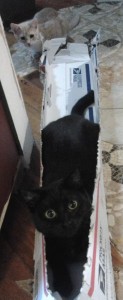Should pet cats be kept indoors?
Many wildlife enthusiasts insist that pet cats should be kept indoors due to the devastating effect they can have on wildlife. Some cat lovers insist, however, that cats that are allowed outside have a much more fulfilling and happy life.
Cats are instinctual hunters and even well fed cats and cats that have not been trained to hunt by their mother for food, will kill or lethally injure small animals. They are drawn to movements made by small animals and will pounce and cruelly play with any unfortunate creature. Individual cats vary in their hunting prowess. The average outdoor cat kills over 100 animals each year, but individual cats have been known to kill over 1000 animals in a year. Of the animals killed by domestic cats about 60-70% are small mammals, 20-30% are birds, the remaining ~10% include amphibians, reptiles and insects.
We know that cats were domesticated by the Egyptians as early as 8,000 years ago. Cats were domesticated in other parts of the world, as well. Throughout history, people have appreciated and even revered their cats for controlling rodent populations; especially when people depended on their grain stores for surviving the winter or to last through a long sea voyage. Ironically, cats and cat-lovers were persecuted during the time of the bubonic plague. They were thought to be Satan’s familiars and their owners, witches. The killing of cats allowed rat populations to explode, expanding the spread of the fleas that carried the disease!
Should today’s cats be simply pets, or house decorations? Or can they still carry on their historical purpose? Where you live and the personality of your cat may help you to decide. People that live in rural areas or businesses (such as plant nurseries) that carry items that are attractive to rodents often still keep “barn cats” for rodent control.
Unfortunately it has been shown that cats usually kill a disproportionate number of native species versus the target non-native pest species. I live in a rural area and liked to think our outside cat controlled the mice and voles that are sometimes a problem. But he often preyed on birds– and every time native squirrels or chipmunks moved into the area, they were soon eradicated.
Cat owners in urban and suburban areas should seriously consider keeping their cat indoors. Do your neighbors have outside cats? Do you have any idea of the total number of outside cats in your area that may be impacting wildlife populations? (Other neighbors may also be happy not to have cats digging in their gardens!)
Living outdoors, in general, is more dangerous for cats. They may become prey themselves or get run over by a vehicle. They are exposed to more diseases and parasites and often are injured in fights with other cats or wild animals, or they may simply get lost or stolen. Outdoor cats have an average lifespan of 3-5 years, whereas indoor cats usually live into the late teens. We only have indoor cats now for these reasons.
Domestic cats are not a natural part of our ecosystem. Feral cats should be controlled. Native predators such as foxes and raptors compete for and depend on the prey species that cats kill.
It is much easier to keep a cat inside that has never been allowed outside. Certain breeds may adapt better to a confined life. (I had a neurotic Abyssinian—it may have been due to inbreeding, but I believe he would have been happier if he had been allowed outside, as many Abby breeders recommend.) Each cat is different. Some cats prefer the safety and security inside; others like the excitement of the outside world. Some cat-owners go to great lengths to keep their cat sufficiently entertained inside their home; buying toys and building special play areas.
Each cat owner will have to make a decision. If you do decide to let your cat roam, be aware of the effect your cat may have on native wildlife populations and that your cat may become prey for other predators!


